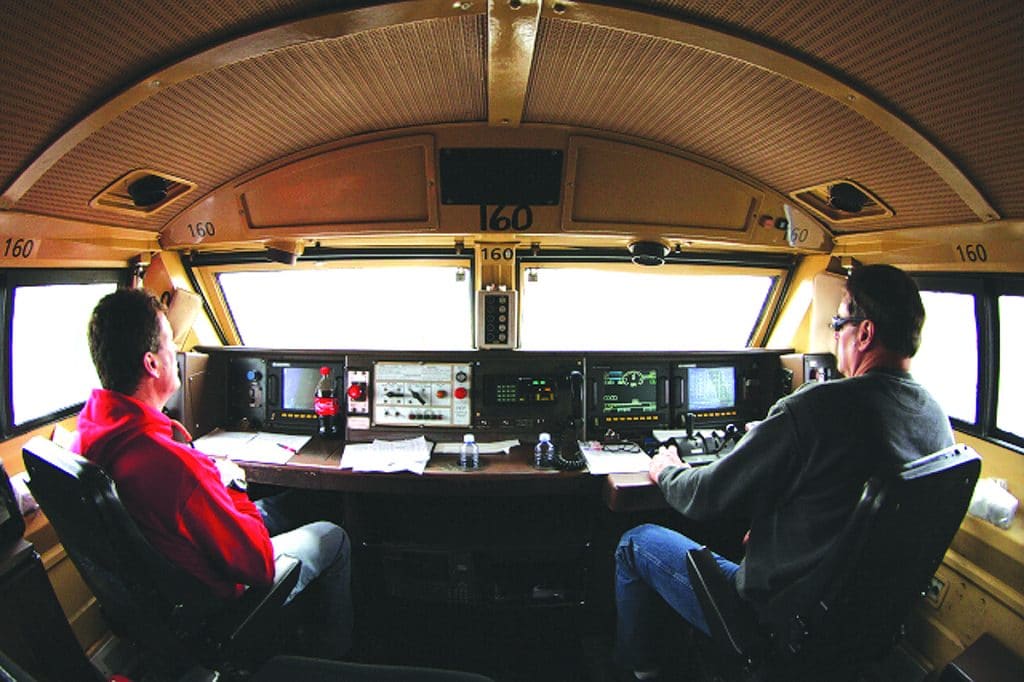

“Our efforts to promote the two-person crew legislation in Ohio have been stalled by the failure of both Republican committee chairmen to schedule further hearings on Senate Bill No. 229 and House Bill No. 371,” Gardner said.
Sponsor testimony was presented by co-sponsors Rep. Michele Lapore-Hagan (D – Dist. 61) and Michael Sheehy (D – Dist. 46) for H.B. 371 November 17 in the House Commerce & Labor Committee and it was indicated that further hearings would be held. However, no further hearings have been held on the bill.
Sponsor testimony for S.B. 229 was presented November 18 in the Senate Public Utilities Committee. At the presentation, Senate Public Utilities Chairman Bill Seitz (R – Dist. 8) informed state Senators Joseph Schiavoni (D – Dist. 33) and Kenneth Yuko (D – Dist. 25) that Federal Statute 45 USCA Section 797j of the Regional Railroad Reorganization Act of 1973 (or “3R Act”) preempted the legislation.
The preemption states:
“No state may adopt or continue in force any law, rule, regulation, order, or standard requiring the Corporation to employ any specified number of persons to perform any particular task, function, or operation, or requiring the Corporation to pay protective benefits to employees, and no State in the Region may adopt or continue in force any such law, rule, regulation, order, or standard with respect to any railroad in the Region.”
Gardner researched this statute and contacted rail safety expert and Designated Legal Counsel Larry Mann for his opinion.
Mann replied, “The purpose for which the “3R Act” was enacted has been satisfied. Therefore, it is my opinion that the law has been repealed by implication. In the Rail Safety Improvement Act of 2008, Congress required the FRA to study the impact of repealing Section 711 of the 3R Act. FRA issued its report in 2011 and concluded:
“The statutory purpose for which Section 711 was originally enacted has clearly been satisfied. Conrail has been successfully returned to the private sector and no longer requires a special statutory exemption from state laws requiring it to employ any specified number of persons to perform any particular task, function or operation.”
FRA further stated:
“The primacy of Federal law over state law in this area existed in order to serve a narrow and specifically defined purpose: the privatization of Conrail. That purpose has been met and it is appropriate to return to the primacy of state law.”
Gardner forwarded Mann’s response to Senate co-sponsors Schiavoni and Yuko, and to House co-sponsors Lapore-Hagan and Sheehy to inform the chairmen of both committees of this finding.
“This effort has been to no avail; no further committee hearings have been scheduled in either the House or Senate,” Gardner said. “Senator Bill Seitz has poisoned the well with his influence as a politician in the Senate and the House.
“Therefore, I’m requesting the help of Ohio members as well as every SMART TD member’s help to call, email and write letters to each member of the House Commerce & Labor Committee as well as each member of the Senate Public Utilities Committee.
“Voice your opinion on this important legislation. Urge and convince them these bills are important for our members’ safety and for the safety of the communities that trains pass through,” Gardner said. “Inform them to convey to Chairmen Seitz and Young the necessity to schedule further hearings on S.B. 229 and H.B. 371, and let the committee members decide as to whether or not to forward these bills to the full House and full Senate to be voted upon.
“Please be aware that there are no further hearings scheduled, then the two-person crew legislation will go no further. The legislation will die without the chance to go before the full House and full Senate to be voted on.
House Commerce & Labor Committee members and contact information:
- Ron Young, telephone: 614-644-6074, email: rep61@ohiohouse.gov
- Anthony Devitis, telephone: 614-466-1790, email: rep36@ohiohouse.gov
- Steven Arndt, telephone: 614-644-6011, email: rep89@ohiohouse.gov
- Louis W. Blessing III, telephone: 614-466-9091, email: rep29@ohiohouse.gov
- Tom Brinkman Jr., telephone: 614-644-6886, email: rep27@ohiohouse.gov
- Mike Duffey, telephone: 614-644-6030, email: rep21@ohiohouse.gov
- Ron Hood, telephone: 614-466-1464, email: rep78@ohiohouse.gov
- J. Kyle Koehler, telephone: 614-466-2038, email: rep79@ohihouse.gov
- Al C. Landis, telephone: 614-466-8035, email: rep98@ohiohouse.gov
- Dorothy Pelanda, telephone: 614-466-8147, email: rep86@ohiohouse.gov
- Kristina Roegner, telephone: 614-466-1177, email: rep37@ohiohouse.com
- Michele Lapore-Hagan, 614-466-9435, email: rep58@ohiohouse.gov
- Teresa M. Fedor, telephone: 614-644-6017, email: rep45@ohiohouse.gov
- Alicia Reece, telephone: 614-466-1308, email: rep33@ohiohouse.gov
- Stephen Slesnick, telephone: 614-466-8030, email: rep49@ohiohouse.gov
- Martin Sweeney, telephone: 614-466-3350, email: rep39@ohiohouse.gov
Senate Public Utilities Committee members and contact information:
- Bill Seitz, telephone: 614-466-8068, email: sd08@ohiosenate.gov
- Troy Balderson, telephone: 614-466-8076, email: balderson@ohiosenate.gov
- Kevin Bacon, telephone: 614-466-8064, email: sd03@ohiosenate.gov
- John Eklund, telephone: 614-644-7718, email: Eklund@ohiosenate.gov
- Cliff Hite, telephone: 614-466-8150, email: hite@ohiosenate.gov
- Thomas Patton, telephone: 614-466-8056, email: patton@ohiosenate.gov
- Bob Peterson, telephone: 614-466-8156, email: peterson@ohiosenate.gov
- Joseph W. Uecker, telephone: 614-466-8082, email: uecker@ohiosenate.gov
- Sandra Williams, telephone: 614-466-4857, email: Williams@ohiosenate.gov
- Lou Gentle, telephone: 614-466-6508, email: sd30@ohiosenate.gov
- Tom Sawyer, telephone: 614-466-7041, email: tomsawyer@ohiosenate.gov
Related News
- After FRA rule, Jared Cassity explains why we still need the Rail Safety Act
- ALERT for L.A.-area members — operator stabbing suspect at large
- SMART-TD wins SEPTA members’ security in their chosen craft
- Shining brightly in the midst of darkness
- Early-bird pricing for TD National Training Seminar ends April 30
- SMART-TD endorses U.S. Sen. Mike Braun (R-Indiana) as the next governor of the Hoosier State!
- FTA action on bus, transit safety plans praised by SMART-TD
- 27 transit members reinstated back to work in Montebello, California
- FRA crew-size rule came from our collective power
- SMART-TD, FRA announce federal regulation requiring two-person freight crews